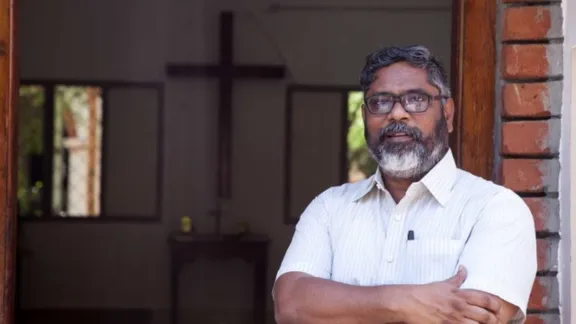
The executive secretary of the United Evangelical Lutheran Churches in India, Rev. Joshuva Peter, says the disease âis exposing once again Indiaâs deep economic divideâ with the countryâs poorest people being hardest hit by restrictions aimed at curbing the spread of infections. Photo: Vinod Baluchamy/UELCI.
UELCI appeals for support to help member churches continue vital work with those worst affected by pandemic
(LWI) - Lutheran churches in India are calling for support as they seek to provide a lifeline to the most vulnerable sectors of the population affected by the Coronavirus disease (COVID-19) pandemic. While wealthier families are able to respect the government’s quarantine regulations, they say, those living below the poverty line – including daily laborers and migrant workers – are facing unprecedented challenges.
The executive secretary of the United Evangelical Lutheran Churches in India (UELCI), Rev. Joshuva Peter, says the disease “is exposing once again India’s deep economic divide” with the country’s poorest people being hardest hit by restrictions aimed at curbing the spread of infections.
As of 20 April, India had reported 17.265 cases of the virus with 543 deaths. On Monday, the government eased restrictions imposed as part of a nationwide lockdown, allowing some agricultural businesses such as farms and fisheries to resume operations. Essential public works will also re-open under strict social distancing guidelines, and trucks will be allowed to travel across state borders to permit distribution of agricultural produce.
We asked Rev. Peter how the 12 member churches of the UELCI are working to support those worst affected by the current crisis.
On 14 April, the Prime Minister of India announced the extension of the earlier 21-day nationwide lockdown until 3 May 2020. The rich and the upper middle-class families stay comfortably in their homes while the lower middle class and the people who live below the poverty line face all kinds of misery.
During this crisis, almost all of our member churches have done impressive emergency relief work supporting the most vulnerable with local resources and providing food to hungry people who have lost their livelihoods because of the lockdown.
To begin with, the government ordered all distribution of food and essential supplies to be done exclusively through their official networks, causing a stalemate in relief work done by churches and NGOs. But this order was challenged by the opposition party and the court has ruled that it is sufficient for us to inform the government of our work, provided we comply with physical distancing and other safety instructions.
Can you give us any details of the support you are providing and how you hope to continue funding this work?
Yes, in two slum areas in Chennai, for example, we are working with 500 poor families through a partnership with the Slum Women Advancement Program (SWAP). We are also supporting 100 men, women and transgender people infected or affected with HIV and AIDS who are living in and outside of Chennai suburban areas.
We are hoping that our partners will come forward to help us support these and others in greatest need, particularly the many migrant workers and the daily laborers in the informal sector.
Your member churches are also cooperating with the government to provide hospital beds and medical care for COVID-19 patients, aren’t they?
Yes, our member churches’ mission hospitals are playing a crucial role in the fight against COVID-19. For example, our mission hospital in Navarangpur has given 200 beds to the government, another at Padhar has allotted 50 beds, and St Joseph’s eye hospital has dedicated 25 beds for treatment of COVID-19 patients.
Member churches have been approached individually to make necessary arrangements in their hospitals to face any critical situation that may arise, and this has developed a good rapport with local government authorities. Also, our member churches’ educational institutions have been approached by the government to provide big halls and classrooms which could serve as isolation wards in which suspected COVID 19 people could be quarantined.
National government authorities have also commended the active involvement of UELCI member churches and their institutions joining hands with them in the fight against COVID 19. This has been made possible by the able leadership of our churches and the constant encouragement that we receive from our partners, for which we are grateful to you all.
Finally, how are you trying to support people in your member churches at this time of great uncertainty and suffering for so many?
As UELCI family, we continue our prayer network, “Pray from Home and Work from Home” with the goal of keeping our staff engaged in this crisis situation. We are in constant touch with our member Churches providing words of encouragement and prayer for all leaders and all congregations at this difficult time.
We are approaching our partners because we are aware that our interventions to support the most vulnerable are considerably less than we would like, given this moment of crisis. However, we are blessed with the great human resources and expertise to plan and implement, so we are doing all we can to assess the needs of member churches and help them strategize to do whatever they can.
At this Easter time, let us hope and pray that the resurrected Christ would grant us healing and life in all its fullness.


